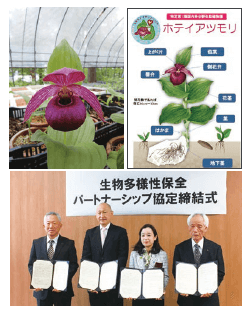The Nichirei Group is engaged in a wide variety of businesses globally, centered on food, and our business is dependent on the blessings of the Earth generated from biodiversity, including agricultural, livestock, and fishery resources. Recognizing various impact to this planet by our business activities, while we rely heavily on natural capital and ecosystem services, which are the blessings of the Earth, we are committed to the conservation of biodiversity and sustainable use of natural capital in our supply chain based on the “Nichirei Group Biodiversity Policy”.
In March 2024, Nichirei Corporation endorsed the philosophy of the Taskforce on Nature-related Financial Disclosures (TNFD) and joined the TNFD Forum to support its activities. Based on the TNFD's disclosure framework, we will continue to organize the relationship between our business and natural capital, as well as risks and opportunities, and promote appropriate measures in our business activities, as well as appropriate disclosure of information on natural capital.

As“living in symbiosis with nature” is one of the three priorities of the Nichirei Group’s Environmental Policy, the Group is committed to environmental conservation activities. Within its business activities, the Group actively procures sustainable materials and processed items, builds recycling systems in collaboration with business partners and local communities, and disseminates information and conducts activities for biodiversity conservation and environmental awareness raising at worksites and suppliers.
The biodiversity-related initiatives are reported at the Group Environmental Managers Meeting held eight times a year with operating companies and at the Group Sustainability Committee held at least three times a year. Depending on the situation, they develop policies or strategies covering the Group. Biodiversity initiatives based on the TNFD's information disclosure framework, which has been in place since 2023, are also disclosed after deliberation by the Group Sustainability Committee mentioned above.
The Nichirei Group is engaged in a wide range of businesses globally, mainly in the food industry, and is dependent on the natural capital generated by biodiversity. In light of the dependence and impact of our business activities on natural capital, we conducted an assessment using the framework proposed by the TNFD. We will strive to become a sustainable company by quantitatively understanding the risks and opportunities we have identified and reflecting our responses to them in our management strategies.

In order to understand the risks and opportunities to the overall Nichirei Group business, we conducted an assessment using the LEAP approach advocated by TNFD. This analysis covers our upstream value chain encompassing regions where we procure raw materials, as well as the direct operations of all 202 Nichirei Group business sites. Based on the assessment results, we identified “water resources” as the most important risk common to the Group, and started specific initiatives for sites with high water stress ahead of others. We will continue our efforts to conserve and restore biodiversity, including from the perspectives of “water resources” and “agricultural, livestock, and fishery resources".
1. Assessment of Dependence on and Impact on Nature through Business Activities
Our businesses are highly dependent on natural capital and ecosystem services. We clarified the relationship between our businesses and nature by identifying significant dependencies and impacts on nature in our upstream value chain and direct operations, and by assessing the degree of those dependencies and impacts.
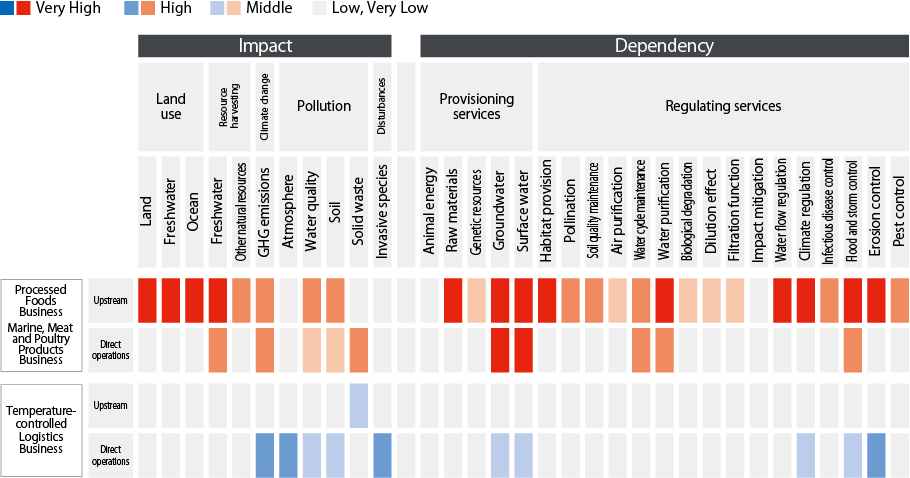
2. Identify Risks and Opportunities in the Value Chain
To delineate the relationships among Group businesses and nature-related dependencies and impacts, we used the four quadrants of upstream, direct operations, impacts and dependencies and then identified risks and opportunities in our businesses.
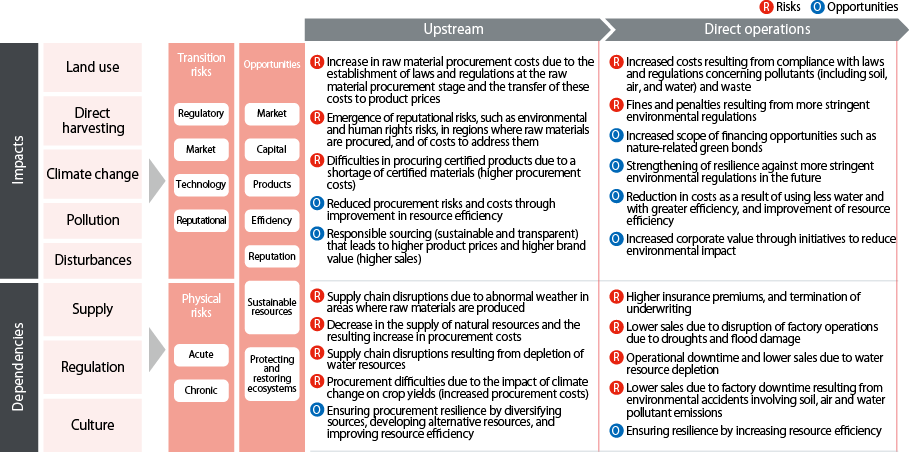
3. Identify High-priority Risks and Opportunities
We assessed the importance of identified risks and opportunities, with due consideration of the probability of manifestation and the impact on Group businesses, and identified items that may have a large financial impact on our businesses as risks and opportunities for the Nichirei Group.
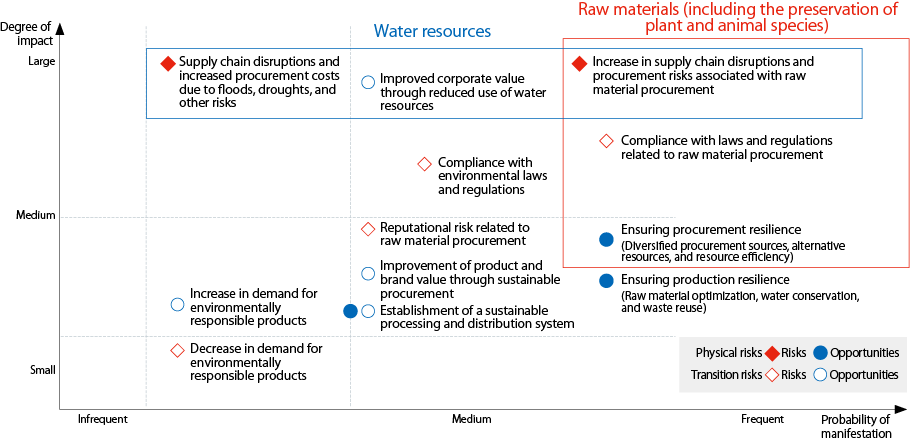
Impact with the variety of risks (including nature-related risks) are considered from comprehensive perspective by the responsible divisions in the rational and optimal methods and the risks are also deliberated and reviewed by the 'Group Risk Management Committee', which is chaired by the representative director and president. The committee has been managing our responses to major risks related to business operations. Due to the need to respond more quickly and accurately to various ESG-related issues, we discuss in the 'Group Sustainability Committee' that deliberates specifically on addressing ESG risks and opportunities, including biodiversity.
The Group Sustainability Committee works with the strategic planning and sustainability divisions of each operating company to identify important ESG-related issues and risks. The most important themes are then deliberated by the committee. Specifically, the environmental risks associated with climate change and biodiversity are positioned as a major risk for the Group. The committee deliberates and manages business risks and opportunities arising from scenario analyses, etc.
Nichirei Group Material Matters (Materiality)
Realizing sustainable food procurement and a circular economy
| Group Targets (KPIs) |
Reduce water consumption at sites with high water stress | Reduce water consumption at high-risk locations and implement water conservation activities (FY2031 target) |
|---|---|---|
| Conduct biodiversity conservation activities at Nichirei Group sites and Company-owned land | Engage in biodiversity restoration activities, including the preservation of plant and animal species at Group sites(FY2031 target) |
About 60% of Japan’s imported clams are sourced from wetlands along the Yellow Sea coast of China. Since 2006, Nichirei Fresh has procured clams from China for use as a premium ingredient. In recent years, however, we have become concerned about the declining yield of clams and the deterioration of the natural environment.
In 2016, Nichirei Fresh collaborated with Dandong Taihong Foodstuff Co., Ltd., a supplier of clams, and the World Wide Fund For Nature (WWF) in a fisheries improvement project.*1
In 2021, the shellfish fishery of the Yalu Estuary received Marine Stewardship Council (MSC) certification*2 for sustainable fishing that considers the rich natural environment of the Yellow Sea coast, which is indispensable as a resting and feeding place for migratory birds. The certification was the first example of a shellfish fishery improvement project in China involving cooperation between participants in the supply chains of China and Japan.
Nichirei Fresh will continue to increase the number of products that bear the MSC certification* for sustainable fishing.
●Key Elements of the Coastal Wetland Ecosystem of the Yalu River Estuary
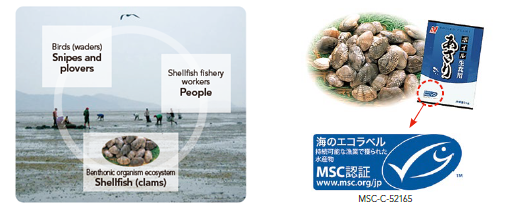
Nichirei owns land near Lake Hibara in Fukushima Prefectureʼs Urabandai region. The Company supports research on the natural environment in the surrounding areas and environmental and biodiversity conservation based on that research.
Following the 1888 eruption of Mount Bandai, all vegetation disappeared from the Urabandai area, but more than 130 years on, one can see vegetation returning: red pine forests, white willows, reeded wetlands, and aquatic plant clusters in marshlands.
The red pine forests, planted by people who want to see the return of greenery, continue to spread.
But since the Companyʼs land remains unforested, it provides a valuable area for observing the transition of virgin nature.
Nichirei has supported the research activities—carried out since FY2012 in the Urabandai area—by the Support Division for Projects in Natural Symbiosis and Regeneration at Center for Practical and Project-Based Learning, Graduate School of Symbiotic Systems Science and Technology, Fukushima University.
In FY2020 (ended in March, 2020), we supported an investigation of insect fauna inhabiting reed marshes in Urabandai area Nichirei-owned land, as well as a study into the diversity of plant species conducted with the goal of publishing a book on Urabandai flora.
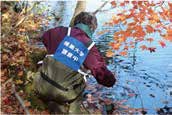 Water quality surveys in the Urabandai area wetlands
Water quality surveys in the Urabandai area wetlands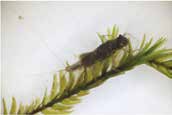 The Himeshiro dragonfly: a new species
The Himeshiro dragonfly: a new speciesSince FY2004, the Nichirei Group has helped in the conservation and regeneration of the endangered orchid Cypripedium macranthos var. macranthos and other species through research on and the breeding of orchids and other plants in Fujimi-machi, Nagano Prefecture. In 2014, some artificially propagated orchids of this species flowered and, in FY2020 they produced 32 blooms. Consequently, Nichirei entered a biodiversity conservation partnership agreement with Fujimi-machi, Nagano Prefecture, and the Fujimi-machi Atsumorisou Regeneration Committee in February 2019. The Group will provide the technologies necessary for the conservation and regeneration of Cypripedium macranthos orchids and cover a portion of the costs. In June 2021, the Committee began selling artificially propagated blooms and seedlings, which it hopes will help prevent excessive picking of wild indigenous species. In our artificial pollination efforts, we avoid mixing plants from the same lineage as much as possible in order to preserve genetic diversity.
